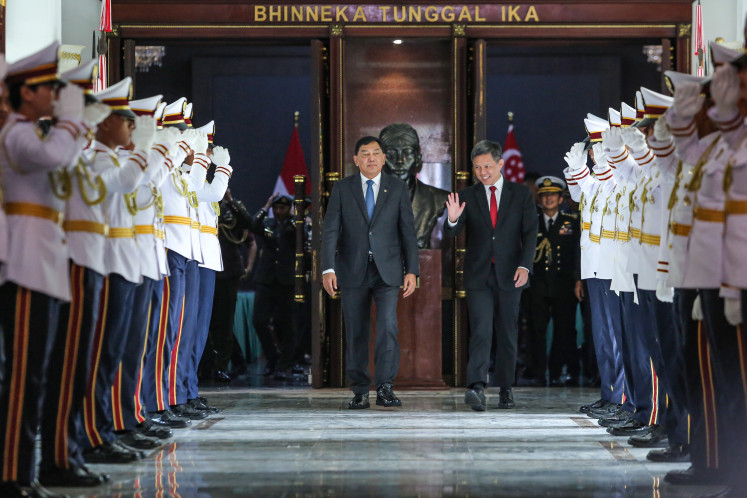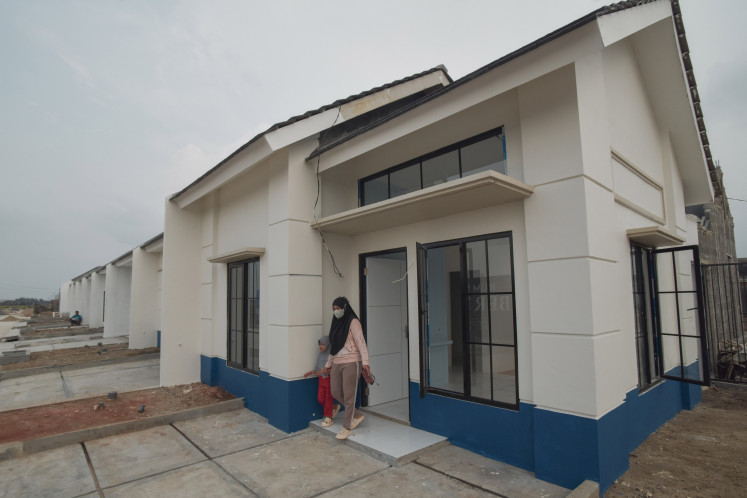Popular Reads
Top Results
Can't find what you're looking for?
View all search resultsPopular Reads
Top Results
Can't find what you're looking for?
View all search resultsReview needed on imprudent spending on civil servants
While the nation’s energy has been largely focused on weeding out corruption and collusion since the reform era, the poor distribution of state budget funds in regions deserves extra attention, otherwise the country’s development will be stalled
Change text size
Gift Premium Articles
to Anyone
W
hile the nation’s energy has been largely focused on weeding out corruption and collusion since the reform era, the poor distribution of state budget funds in regions deserves extra attention, otherwise the country’s development will be stalled.
Recent events have confirmed that many regions in the country have spent most of their public money on civil servants’ payrolls, leaving the rest for infrastructure, health, education and other public services.
The ideal percentage of state budget funds spent on the bureaucracy is not supposed to exceed 50 percent. However, data shows that in many regions civil servants’ payrolls average 57 percent. In certain areas, the bureaucracy costs over 80 percent of the regional budget.
It should be admitted, however, that some regional governments have already prudently spent money on civil servants’ salaries, which amounts to 40 percent of the total budget.
The data, if proven, is disheartening, considering the fact that bureaucracy apparatus have yet to show stellar performances and are often accused of generating a higher-cost economy due to their poor productivity.
So, why should we spend so much on ineffective bureaucracy, which is not helping people but fostering red tape instead?
The excessive number of civil servants, which leads to the high proportion of public spending, is the result of poor recruitment and manpower planning processes in central and regional administrations.
It has become an entrenched practice that high ranking government officials, both in central and regional government, often create posts and jobs, including contractual ones, for their relatives or families amid a highly competitive job market.
The problem is compounded by a deep-seated belief that working as civil servants is much more secure and offer people better pension schemes.
A friend of mine who lives in East Nusa Tenggara recalled that he was often belittled by his girlfriend’s parents because, in his area, private sector workers were considered second-class citizens.
It is little wonder, therefore, that civil servant admission tests always draw a huge number of applicants.
To make matters worse, the number of civil servants has climbed significantly in the past 10 years, as the central government and the House of Representatives have steadily approved the establishment of 205 new regency and provincial governments throughout the country, following regional autonomy that began in 2001.
Spending too much money on civil servants is unhealthy for the development of a region because it will reduce the amount of money allocated for the improvement of infrastructure and public services. We can easily spot shabby road facilities, not only in the regions, but also in Jakarta.
A recent report by the private television channel, Trans 7, shows that public toilets, including those inside government offices in Jakarta, are unhygienic and unkempt, unlike toilets located in shopping malls, hotels and other places run by private companies.
Another private channel, Metro TV, recently carried out an in-depth report on the poor condition of school buildings, and poverty in general in the Banten area.
Had most of the regional budget been spent to address poverty, education and healthcare in the area, it would have raised the well-being of many people in the province.
The government is to be commended for planning to introduce a moratorium on civil service recruitment by the end of this year. President Susilo Bambang Yudhoyono is set to issue an instruction in October to realize the plan.
However, this promising start should be followed by another moratorium on further regional division. In many cases, the House and the central government succumbed to the demand of local political elites for the creation of new administrative regions.
The establishment of new regions is detrimental for the state budget as they will require a huge amount of human resources to run the bureaucratic infrastructure. The start-up expenditure will not only sap the budget of the respective new governments, but also of the state.
The law on regional autonomy requires that the central government disburse General Allocation Funds (DAU) to regional governments to finance their development, including paying the salaries of local civil servants.
The huge amount of spending on bureaucracy eclipses budget allocations for people’s welfare, thus running counter to the objectives of regional division.
A suspension of regional division will help end the practice and enhance good governance in the regions.
The central government can take an initiative in addressing the problem. In the future, it should only allocate DAU for developmental purposes, while the cost of civil servants’ payrolls should be shouldered by regional administrations themselves.
Finance Minister Agus Martowardojo said that last year, the amount of state budget funds allocated to pay civil servants’ salaries rose to Rp 198 trillion (US$23.3 billion), from the previous year’s Rp 123 trillion.
In contrast, the money spent for modality of development (infrastructure and development), decreased to Rp 96 trillion in 2010 from Rp 104 trillion the previous year.
It is high time for the central government to review the country’s spending on its bureaucracy if Indonesia is to realize its dream of becoming the world’s 15th largest economy in a few decades’ time.
The country should lay a firm foundation for good governance and ensure the prosperity and welfare of its people to embrace that era.
The author is a staff writer at The Jakarta Post.










